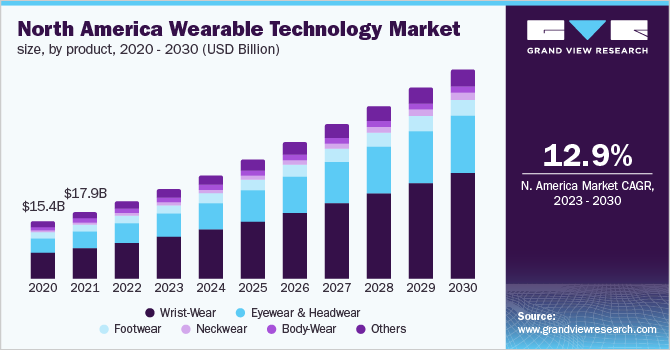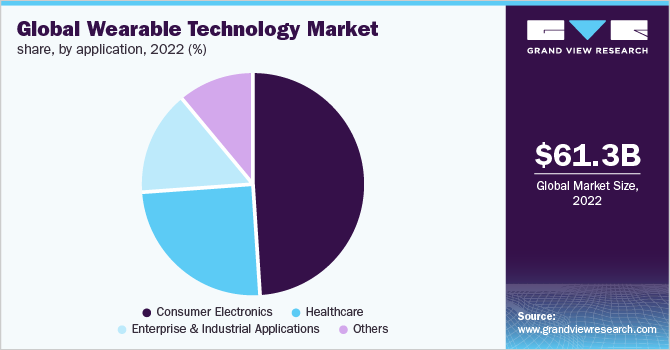- Home
- »
- Automotive & Transportation
- »
-
Wearable Technology Market Share & Trends Report, 2030GVR Report cover
![Wearable Technology Market Size, Share & Trends Report]()
Wearable Technology Market Size, Share & Trends Analysis Report By Product (Head & Eyewear, Wristwear), By Application (Consumer Electronics, Healthcare), By Region (Asia Pacific, Europe), And Segment Forecasts, 2023 - 2030
- Report ID: 978-1-68038-165-8
- Number of Report Pages: 142
- Format: PDF, Horizon Databook
- Historical Range: 2018 - 2021
- Forecast Period: 2023 - 2030
- Industry: Technology
Report Overview
The global wearable technology market size was valued at USD 61.30 billion in 2022 and is expected to expand at a compound annual growth rate (CAGR) of 14.6% from 2023 to 2030. The increasing adoption of smart wearable technology products among consumers is driving industry growth. These devices aid in monitoring health by keeping track of cholesterol levels, calories burnt, oxygen levels, etc., through sensors. In addition, several companies, such as Fitbit, Samsung, Noise, and Fossil Group, Inc., are introducing wearable technology watches and other accessories with health tracking solutions. Such a feature is anticipated to attract consumers as it helps them check their health, which paves the way for market growth.

For instance, in March 2022, Xiaomi Corp. launched the latest Xiaomi Watch S1 Series. It has 117 fitness modes and tracks blood oxygen saturation, health monitoring, and sleep monitoring. It has magnetic charge capabilities along with Amazon’s Alexa voice assistant. Rapid changes in consumer demographics, such as changing lifestyle patterns and preferences, are expected to boost product demand, which is anticipated to drive industry growth. In addition, high consumer spending on personal care products is projected to support the demand for wearable devices. The demand for smartwatches among swimmers, cyclists, runners, and gym-goers is high as they aid in tracking the calories burnt, hourly activity, and stationary time.
In addition, many vendors are focused on introducing products with multiple sports options, a large display, a better battery, and a rugged metal casing attracting athletes. This is expected to drive industry growth. Integrating AI and AR technologies enable manufacturers to add new advanced features to their products. For instance, the Adaptive EQ technology introduced by Apple, Inc. with the launch of their AirPods in 2021 tunes the sound in real-time based on the profile and fit of the user’s ear. The advent of technology has led to the integration of smart wearables in clothing, also known as smart clothing. Smart or IoT-based apparel are electrical components integrated into clothing that offer services, which can be used in larger smart systems through communication-based protocols.
The use of wearable devices in healthcare is rising due to the pandemic as these products offer advantages and benefits to both patients and healthcare providers. Some of these benefits include real-time health monitoring of vital statistics and earlier detection of disease or risk of a significant health event. Wearable technologies and ear-worn have witnessed robust growth as consumers rely on these devices for remote work, health tracking, fitness activities, and more. However, the increasing availability of counterfeit products is expected to challenge market growth. A rise in the production of low-cost fraudulent devices with more offerings and benefits is expected to restrain the growth of the industry as consumers usually opt for products offering similar features at a considerably lower price.
Product Insights
On the basis of products, the global industry has been further categorized into wristwear, eyewear & headwear, footwear, neckwear, body wear, and others. The wrist-wear product segment dominated the global industry in 2022 and accounted for the maximum share of more than 49.45% of the overall revenue. Several manufacturers of smartwatches and fitness trackers target consumers, such as athletes, adventure lovers, and sports enthusiasts, to increase their product sales. These devices provide fitness-related metrics and encourage a healthy lifestyle by providing information on calorie intake, water intervals, and step monitoring.
Headwear & eyewear is estimated to be the second-largest and second-fastest-growing product segment from 2022 to 2030. The increasing implementation of Virtual Reality and Augmented Reality (VR & AR) headsets in the multimedia and healthcare industries and the rising uptake of smart hats are projected to support the growth of this segment. Furthermore, the increasing popularity of smart caps, due to their data-driven insights and tracking technology, is estimated to boost segment development. Several companies, such as Spree Wearables and Life BEAM, are introducing smart hats in the global industry.
Application Insights
The consumer electronics application segment led the industry in 2022 and accounted for the maximum share of more than 48.95 % of the overall revenue. The increase in the use of wearable technology, such as fitness bands and AR/VR headsets, can be credited to the high share of this segment. Many manufacturers, like Garmin Ltd., Omron, Apple Inc., and Nemaura, concentrate on creating gadgets that deliver data, which incorporates both clinical and non-clinical information. For instance, Nemaura’s sugarBEAT Wearable Technology dispenses with the daily finger-prick calibration process by enabling frequent blood glucose monitoring in diabetic patients.

The healthcare segment is anticipated to register the second-fastest growth rate from 2022 to 2030. The increasing application scope of wearable devices in the pharma sector will support segment growth over the forecast period. Through digital health tech, doctors can connect with their clients via telehealth solutions and phone applications. This allows medical professionals to monitor patients virtually. Advancements in VR and AR are gaining significant attraction in the health segment. VR technology is leveraged in medical practice to assist in surgical training and procedures.
Regional Insights
North America dominated the global industry in 2022 and accounted for the maximum share of 33.80 % of the overall revenue followed by the Asia Pacific and Europe regions. High technology adoption and the ease with which newly released items are made available have been major growth drivers for the regional market. Devices that promote health, facilitate preventive treatment and help manage ongoing ailments are in greater demand in the region. According to the National Library of Medicine, 30% of Americans use wearable medical technology. The Asia Pacific region is expected to register the fastest growth rate from 2022 to 2030.

China is expected to be one of the most important countries in the Asia Pacific regional market on account of a rise in the number of vendors providing products with competitive features. The demand for wearable technology in the country is also expected to be driven by the lower costs of smartphones, which are anticipated to fall further in the near future. The increasing demand from various target customer groups enables manufacturers to reduce product prices with improved production volumes.
Key Companies & Market Share Insights
Major manufacturers focus on new product launches to attain a competitive edge in the industry and expand their product offerings. For instance, on August 2022, Fitbit Inc. announced the launch of its lineup of new watches. The lineup includes Sense 2, Inspire 2, and Versa 4. Some of the prominent players operating in the global wearable technology market include:
-
Alphabet Inc.
-
Samsung Electronics Co., Ltd.
-
Sony Corp.
-
Huawei Technologies Group Co., Ltd.
-
Apple Inc.
-
Xiaomi Corp.
-
Adidas AG
-
Nike, Inc.
-
Fitbit, Inc.
-
Garmin Ltd.
Wearable Technology Market Report Scope
Report Attribute
Details
Market size value in 2023
USD 71.91 billion
Revenue forecast in 2030
USD 186.14 billion
Growth rate
CAGR of 14.6% from 2023 to 2030
Base year for estimation
2022
Historical data
2018 - 2021
Forecast period
2023 - 2030
Quantitative units
Revenue in USD million/billion and CAGR from 2023 to 2030
Report coverage
Revenue forecast, company ranking, competitive landscape, growth factors, and trends
Segments covered
Product, application, region
Regional scope
North America; Europe; Asia Pacific; Latin America; MEA
Country scope
U.S.; Canada; U.K.; Germany; France; China; India; Japan; Brazil; Mexico; Rest of Europe; Rest of Asia Pacific; Rest of Latin America
Key companies profiled
Apple Inc.; Samsung Electronics Co., Ltd.; Fitbit, Inc.; Garmin Ltd.; Huami Co. Ltd.; Fossil Group, Inc.
Customization scope
Free report customization (equivalent to up to 8 analysts’ working days) with purchase. Addition or alteration to country, regional, and segment scope.
Pricing and purchase options
Avail customized purchase options to meet your exact research needs. Explore purchase options
Global Wearable Technology Market Segmentation
The report forecasts revenue growth at global, regional, and country levels and provides an analysis of the latest industry trends in each of the sub-segments from 2018 to 2030. For this study, Grand View Research has segmented the global wearable technology market report based on product, application, and region:

-
Product Outlook (Revenue, USD Million, 2018 - 2030)
-
Wrist-Wear
-
Eyewear & Headwear
-
Footwear
-
Neckwear
-
Body-Wear
-
Others
-
-
Application Outlook (Revenue, USD Million, 2018 - 2030)
-
Consumer Electronics
-
Healthcare
-
Enterprise & Industrial Applications
-
Others
-
-
Regional Outlook (Revenue, USD Million, 2018 - 2030)
-
North America
-
U.S.
-
Canada
-
-
Europe
-
U.K.
-
Germany
-
France
-
Rest of Europe
-
-
Asia Pacific
-
China
-
India
-
Japan
-
Rest of Asia Pacific
-
-
Latin America
-
Brazil
-
Mexico
-
Rest of Latin America
-
-
Middle East & Africa
-
Frequently Asked Questions About This Report
b. The global wearable technology market size was estimated at USD 61.30 billion in 2022 and is expected to reach USD 71.91 billion in 2023.
b. The global wearable technology market is expected to grow at a compound annual growth rate of 14.6% from 2023 to 2030 to reach USD 186.14 billion by 2030
b. North America dominated the wearable technology market with a share of 33.80% in 2022. This is attributable to the increasing health awareness and multimedia device demand in the region.
b. Some key players operating in the wearable technology market include Adidas; Apple Inc.; Fitbit, Inc.; Garmin Ltd.; SAMSUNG; Sony Corporation; and Xiaomi.
b. Key factors that are driving the wearable technology market growth include increasing smartphones & multimedia device demand, infrastructure developments in the mobile industry, and rising disposable income in developing economies.
Share this report with your colleague or friend.
![gvr icn]()
NEED A CUSTOM REPORT?
We can customize every report - free of charge - including purchasing stand-alone sections or country-level reports, as well as offer affordable discounts for start-ups & universities. Contact us now
![Certified Icon]()
We are GDPR and CCPA compliant! Your transaction & personal information is safe and secure. For more details, please read our privacy policy.
We are committed towards customer satisfaction, and quality service.
"The quality of research they have done for us has been excellent."





